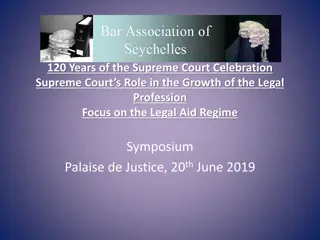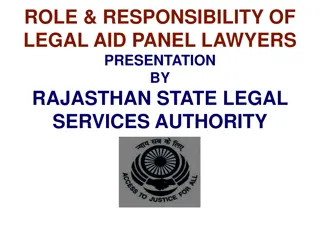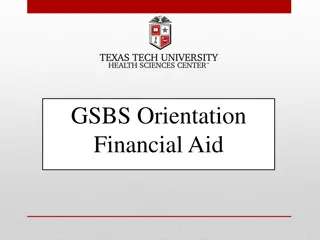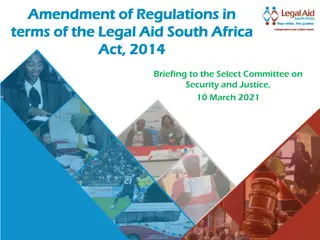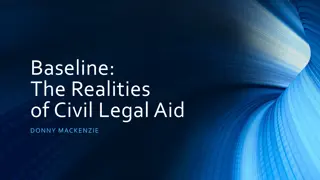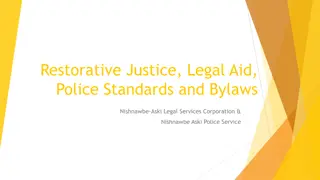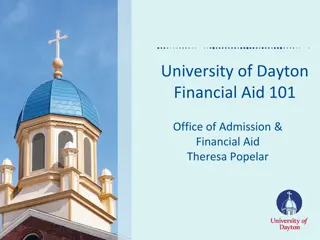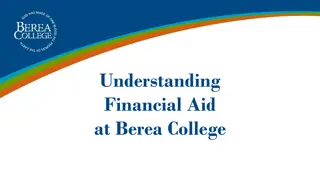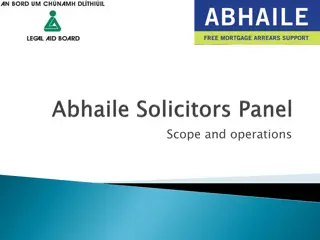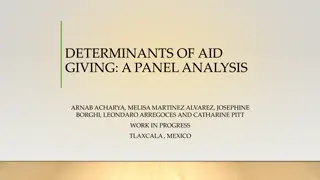Legal Aid Provision and Access: Challenges and Solutions
Rebecca Rayment, a former Legal Aid lawyer and current Chief Executive of Manuel Bravo Project, addresses the complexities of accessing legal assistance, specifically focusing on Legal Aid for vulnerable asylum seekers and migrants. The presentation delves into the current legal advice provision, challenges faced, and potential collaborative solutions within the legal community to enhance access to legal services.
Download Presentation

Please find below an Image/Link to download the presentation.
The content on the website is provided AS IS for your information and personal use only. It may not be sold, licensed, or shared on other websites without obtaining consent from the author. Download presentation by click this link. If you encounter any issues during the download, it is possible that the publisher has removed the file from their server.
E N D
Presentation Transcript
LEGAL PROVISION HANGING BY A THREAD? R E B EC CA R A Y MENT R E B EC CA R A Y MENT C H I E F E X EC U TI V E C H I E F E X EC U TI V E M A NU E L B R A VO P R O JECT M A NU E L B R A VO P R O JECT R E B EC CA . R A YMENT@ MA NUE L BR AV O . O RG . U K R E B EC CA . R A YMENT@ MA NUE L BR AV O . O RG . U K
INTRODUCTION Rebecca Rayment Former Legal Aid lawyer with 12 years experience across both the public and third sectors, specializing in cases involving women and gender-based violence. Currently non-practicing in role as Chief Executive of Manuel Bravo Project. Manuel Bravo Project small Leeds-based charity that provides legal representation for vulnerable asylum seekers, refugees and migrants who are unable to access legal advice elsewhere. We focus on providing a trauma aware service that aims to prevent further trauma being caused by our processes. In the following presentation we will look at legal advice provision in our area, with a particular focus on Legal Aid. We will look at how assistance can currently be accessed and how organisations can support their clients to access legal services. Finally, we will look to the future and ways in which LMP members can work collaboratively to deal with the issue of legal advice provision.
Q: TO THE NEAREST , HOW MUCH DOES A LEGAL AID FIRM GET FOR AN INITIAL ASYLUM CLAIM?
WHAT ARE YOUR EXPERIENCES OF ACCESSING LEGAL HELP? WHAT KINDS OF LEGAL PROBLEMS ARE YOU SEEING THE MOST? ONE THING THAT WOULD MAKE A DIFFERENCE?
Legal Aid Legal Aid - government funding for legal representation. A legal aid solicitor will get paid by the Legal Aid Agency to act on a person s behalf so that the person does not have to pay. Legal aid is mostly means tested and a person must prove they cannot afford to pay in order to access it. Legal Aid Agency Legal Aid Agency Government body responsible for the administration and oversight of Legal Aid provision in England and Wales. Matter start Matter start The technical name the Legal Aid Agency use for a case. Each Legal Aid provider is allocated a certain number of matter starts at the beginning of each year. They are not allowed to exceed the number of matter starts allocated. The larger a provider is, the more matter starts they are likely to be allocated. In scope and out of scope In scope and out of scope In this context, in scope and out of scope refer to legal matters which are allowed to be funded by legal aid. The Government place restrictions on the types of cases that are allowed to receive Legal Aid funding, with many matters falling out of scope . Exceptional Case Funding (ECF) Exceptional Case Funding (ECF) If a matter is deemed to be out of scope , an application to have the matter funded can be made. These are considered on a case-by-case basis and if successful mean that a legal aid lawyer is able to work on the case and bill the Legal Aid Agency for the costs. Controlled Work (CW)/Controlled Legal Representation Controlled Work (CW)/Controlled Legal Representation For our purposes, this is asylum appeal level of work and a further merits test is carried out by the legal aid lawyer (on top of the assessment done when the initial matter is taken on). A refusal to carry out Controlled Work is done on a CW4 form and is a challengeable decision. Technically anyone can challenge a CW4 but in practice it is difficult for individuals to do so. Appeal allowed Appeal allowed This means that the person has been successful in their appeal, not that they are allowed to appeal! JARGON BUSTER
LEGAL AID WHAT CAN IT BE USED FOR? In scope of Legal Aid In scope of Legal Aid Initial asylum claims Fresh claims for asylum Detention and bail work Applications to remain under Domestic Violence provisions Asylum appeals to the First Tier Tribunal Onward appeals on a point of law to the Upper Tier Tribunal, Court of Appeal and Supreme Court Trafficking applications Out of scope of Legal Aid Out of scope of Legal Aid Everything else including asylum support matters!
LEGAL PROVISION NATIONALLY According to the findings of a new report commissioned by Refugee Action into legal advice provision (linked According to the findings of a new report commissioned by Refugee Action into legal advice provision (linked here here), the following points can be made about the UK wide picture: ), the following points can be made about the UK wide picture: The overarching conclusion is that there is not enough free or low-cost immigration, nationality and asylum advice available, and this leaves people at risk of serious harm. Provision in England and Wales is not even adequate for first-time adult asylum applications, with a deficit of at least 6000 for asylum applications and appeals (even allowing for some applicants having the resources to pay privately), let alone other matters for people who are eligible for immigration legal aid. It appears that people are facing increasingly long waiting times to be able to access legal representation. The majority of providers do not use all of their matter starts and do not have capacity to open more. This means the LAA often assumes that supply exceeds demand, because there are unused matter starts in all procurement areas, whereas the opposite is true in practice. Examples were given where lack of access to specialist legal advice, and particularly the lack of mainstream legal aid for the Domestic Violence Concession application, created a barrier to escaping from abusive relationships. In many parts of England and Wales, legal aid provision depends heavily on one individual, or a small number of people. Examples include Plymouth and Stoke-on-Trent where there is only one qualified legal aid caseworker in an asylum dispersal city, and the entire surrounding county. This relates to the wider recruitment crisis, but additionally makes provision precarious in many areas and is a mark of a dysfunctional market. There is a serious shortage of free and low-cost advice outside the scope of legal aid in most parts of England and Wales, leaving undocumented people and those with limited leave unable to regularise or to maintain their lawful immigration status. The deficit in legal aid and non-legal aid capacity across much of the UK means that any area which has a more abundant supply faces inward demand pressure from surrounding areas of shortage. That means certain kinds of case which are more complex or financially more challenging get displaced by the inward demand pressure, and cannot access representation even in areas where there appears to be adequate or surplus provision. Any matter which i) does not have a deadline attached or ii) is likely to be complex and long-running or iii) is likely to make particularly significant financial losses is less likely to be taken on, even in areas with apparently adequate supply. Organisations found it relatively easy to obtain and retain OISC Level 1 accreditation, but much more difficult to reach Level 2.
LEGAL PROVISION REGIONALLY AND LOCALLY There are currently 16 Legal Aid providers in West Yorkshire who hold contracts for Immigration and Asylum, with 23 in total across Yorkshire and The Humber. 6 of those firms are in Leeds (Ison Harrison, Kalsi Solicitors, Bankfield Heath, Immigration Advice Service, Collingwood Immigration and Duncan Lewis). There are approximately 15 legal aid lawyers currently working in Leeds across these firms. In 2021, West Yorkshire had a total of approx. 4,400 matter starts allocated to the above providers. Only 1,348 matters were opened. There is an estimated primary legal aid deficit (i.e. the number of people who need help vs the number of matters providers will be able to open) of -4,329. Legal aid contracts are up for tender this year and it is predicted that at least 3 of the above 6 providers will not continue to run a contract as it will not be financially viable to do so.
HOW TO USE WHAT WE HAVE INITIAL ASYLUM CLAIMS The vast majority of initial asylum claims qualify for legal aid (the merits assessment is very basic) and an asylum seeker looking to make one should always try to access a legal aid solicitor. The provider does not have to be local but it makes the job of preparation a lot easier! Read about inadmissibility and what it means for those claiming asylum here Unless the asylum seeker is a child, legal aid does not cover a lawyer to attend the asylum interview. The lawyer will perform a read back of the interview with the claimant to check for and correct any mistakes. This is often the first contact a claimant will have with their lawyer and is exactly why we ALWAYS recommend that asylum interviews are taped (not done automatically, a request must be made to the Home Office). The delays in Home Office decision making are slowing down the entire process which can cause a lot of anxiety and stress for those waiting in the system. Support during this wait is CRUCIAL as there is little chance of the client getting the reassurance they need from the legal aid lawyer. It is extremely difficult to transfer legal aid cases from one provider to another if the relationship breaks down.
HOW TO USE WHAT WE HAVE ASYLUM APPEALS Legal aid covers asylum appeals but a merits assessment is carried out if the initial claim is refused. In essence, if the claim is deemed to have a greater than 50% chance of success, legal aid will be granted. Obvious what the pitfalls may be and supporters of a person who has been issued with a CW4 can help by looking through the reasons for refusal and potentially helping to challenge if appropriate. Again, help with managing feelings around timescales (the current wait time for a matter to be listed at First Tier Tribunal is approx. 48 weeks!) is crucial and can really make a difference when it finally comes to the appeal hearing. Those who fail the merits assessment and cannot challenge the CW4 are left with the prospect of paying for representation, representing themselves or contacting Manuel Bravo Project for representation. There is a general lack of OISC level 3 advisers nationally, making free appeal work outside Legal Aid all the more difficult to find.
HOW TO USE WHAT WE HAVE FRESH CLAIMS Legal aid is available for fresh claims and is granted subject to a sufficient benefit test would a reasonable private paying individual of moderate means pay for the legal advice and assistance? Support around evidence gathering is really important but also thinking holistically is vital - wellbeing and the ability to fully disclose facts etc. is make or break for asylum claims at any stage. Caution around submitting claims as an individual or without legal advice prior to submission If credibility is an issue, multiple failed claims really don t help!
WHAT DOES MANUEL BRAVO PROJECT HELP WITH? Primarily asylum appeals and fresh claims for complex casework - call us about other matters! Our outreach service provides initial advice across all asylum and immigration matters. Our new website (due to go live in September) will contain lots of helpful resources aimed at both service users and supporters.
WHAT COULD L.M.P DO? Some sort of response/statement/action to the current legal provision crisis at a higher level? Skilling up existing staff? Partner working on new projects to fill gaps? Formation of a new legal aid entity within the third sector (like GMIAU or Bolton CAB)? Working on smoother referral processes that get the right help at the right time and cut down the likelihood of replication?
NEXT STEPS? Q AND A



